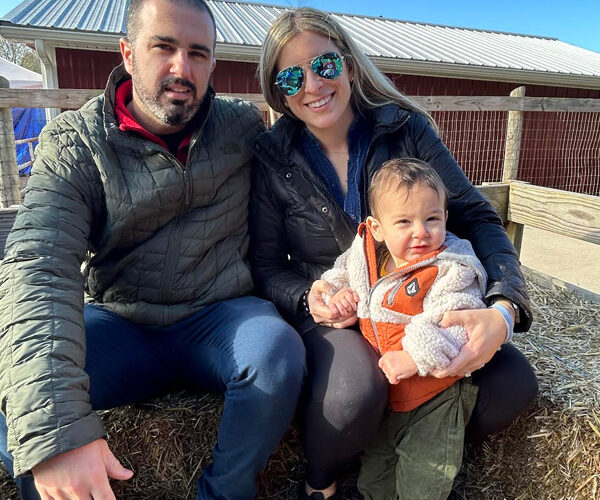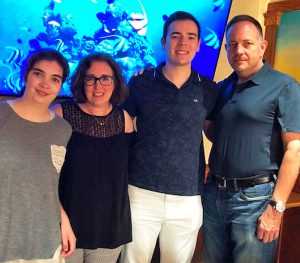By Diane Seegull
Searching For a Paddle

I have always been able to problem solve and effectively deal with challenges. However, when my son Ezra was nine and began having increasing fears and anxieties, I was scared and lost. This feeling, sadly, never left me, even as I consulted professionals in the mental health field. I felt adrift without a paddle. Unfortunately, this feeling stems from problems with the mental health establishment which are both wide and deep.
One thing I have learned is that mental illness does not discriminate. It is natural for some people to look at those suffering from a mental illness and assume there are reasons.
Some theories include that a patient must have experienced poor parenting, domestic abuse, or stress in the home. While often this is the case, I know of numerous situations where those who suffer from mental illness experienced none of the above.
My own children attended a warm Jewish Day School, went to summer camps, participated in sports programs, and enjoyed family vacations. My husband and I provided our sons with a nurturing and loving home and they were surrounded by caring family and friends. Our life seemed very typical except that our son, Ezra, was struggling with a mental illness. Sadly, mental health treatments failed Ezra and he tragically ended his life in 2020, just shy of his 20th birthday.
Ezra began having anxiety and nighttime fears when he was 9 years old. He started seeing a therapist but after a few months it was determined that he would outgrow his current behavior. Ezra performed very well academically but his drive for excellence suddenly began to get out of hand when he was 11.
He was becoming a perfectionist. I knew his anxiety was becoming worse and not better. His social anxiety, that I took for being shy, was not improving. He appeared to be developing a form of Obsessive Compulsive Disorder (OCD) where he would mentally perseverate on things to the point that it was painful for him.
Accordingly, I arranged for him to meet with a psychologist weekly. Unfortunately, Ezra’s anxiety did not improve with therapy alone. By age 13 we had him meet with a psychiatrist. Ezra did respond to some degree to the medication and he continued to see a psychologist and psychiatrist all through high school. But, for him, therapy and medication never provided complete relief. Despite all of his internal anguish, he was somehow able to lead the mock trial club and AIPAC club and was editor of the school newspaper. He fought through his illness to speak in public and lead others. To the outside world, Ezra was not only healthy, he was thriving.
After high school, he went to the University of Michigan. I made every effort to make sure he had adequate mental health support. But mental health support is not always scientific and he did not feel his therapists were helping him. He left therapy for a period of time and tried to push through his issues on his own. He was, however, becoming more and more depressed.
In October of 2019, he overdosed on Advil after notifying some friends. It was a cry for help. He stayed at the University of Michigan Medical Center for a few weeks and was released to the care of a local well-regarded psychiatrist and therapist. Ezra told me and his therapist that he wanted so much to feel better and to live life to the fullest. He even asked about more aggressive treatments, but the mental health providers felt it was too early to take that path.
As a parent, the stigma surrounding mental illness and my desire to protect my son’s privacy resulted in my inability to share openly with others what I, my husband, and he, were going through. Our immediate family, each day carried Ezra’s health issue with us in some way, whether it was going to a doctor’s appointment, making sure he was taking his medicine, eating and sleeping enough, or handling stressors and relaxing enough to enjoy life. My description does not do justice to the toll mental illness puts on a family. When your child does not feel well, you don’t feel well and Ezra did not feel his best most of the time.
One very significant problem that exists for families dealing with mental illness is that there are not enough highly qualified providers to meet demand. This is due, in part, because insurance companies do not compensate mental health professionals sufficiently. Many mental health providers, therefore, do not accept insurance and those who do have long wait lists.
I also believe that there is not enough coordination and cooperation between mental health providers to assess the best way to help patients and their families. When I had breast cancer, I was able to go to one doctor, get a treatment plan, and then get a recommendation to another doctor for a second opinion. I could go online and learn about research and communities that provide support. I had a dedicated nurse who could help me navigate both the mental and medical aspects of my condition. In addition, I could talk with friends and family about my ailment and feel supported.
However, when you are trying to cope with a mental illness, you are unable to follow the same approach. It is difficult to know what treatment your family member will respond to and there is insufficient scientific research or testing to guide patients or professionals. Many professionals do not, with consistency, utilize resources or help patients gain access to education or support in the community or online.
More research is imperative to develop a more scientific approach to treatment. The brain is an extremely complex organ that has been scientifically shown to be unpredictable in its ability to adapt to challenges resulting from illness or trauma. Because my son’s mental illness started at such a young age, I believe that his ailment was in part physiological. I believe medical professionals should be collecting data on those with therapy resistant mental health problems.
Finally, children, along with their parents, need to understand how to be comfortable discussing how they feel and how to manage distress. Children who experience trauma or suffer from any illness will benefit from learning how to express themselves early enough to get help and effectively communicate, without shame, with professionals. One resource I recently found is the organization On Our Sleeves. The goal of this organization is to help children and families talk about mental health and destigmatize it. I do not believe we can wait until children are teenagers to teach them about the importance of good mental health.
Mental illness has tragically affected my entire family. Our family, sadly, will always carry its scars. I am grateful to have learned about Jewish Community Services’ Gathering for Suicide Loss Survivors, a group that offers myself and others the space to share and process our grief, as well as receive guidance and support from a grief specialist. I hope to keep finding ways to make a difference and help other families. Like mine, there are many that are feeling alone and lost.
Half
By: Diane Seegull
Should you pass me by and see me smile
Do not presume that I am sound
For my heart once whole, is no longer
You are seeing half of me
My modality for taste is less acute
Numbness, a constant companion
Sounds of laughter are shrill and
The sight of a sunset draws me to
Where part of me has gone
Be gentle when you approach
I appear impregnable to the naked eye
It’s an illusion of necessity
Until I am whole again
Subscribe to our newsletter
The Associated is a home for everyone in the Baltimore Jewish community. We offer several email lists to help people find a community, engage with their peers and support Jewish journeys around the world.
Join Our Mailing ListAdd Impact to Your Inbox
Sign up for our newsletter
Subscribe to our newsletter
The Associated is a home for everyone in the Baltimore Jewish community. We offer several email lists to help people find a community, engage with their peers and support Jewish journeys around the world.
Join Our Mailing List









 Please Wait while we loading your video.
Please Wait while we loading your video.